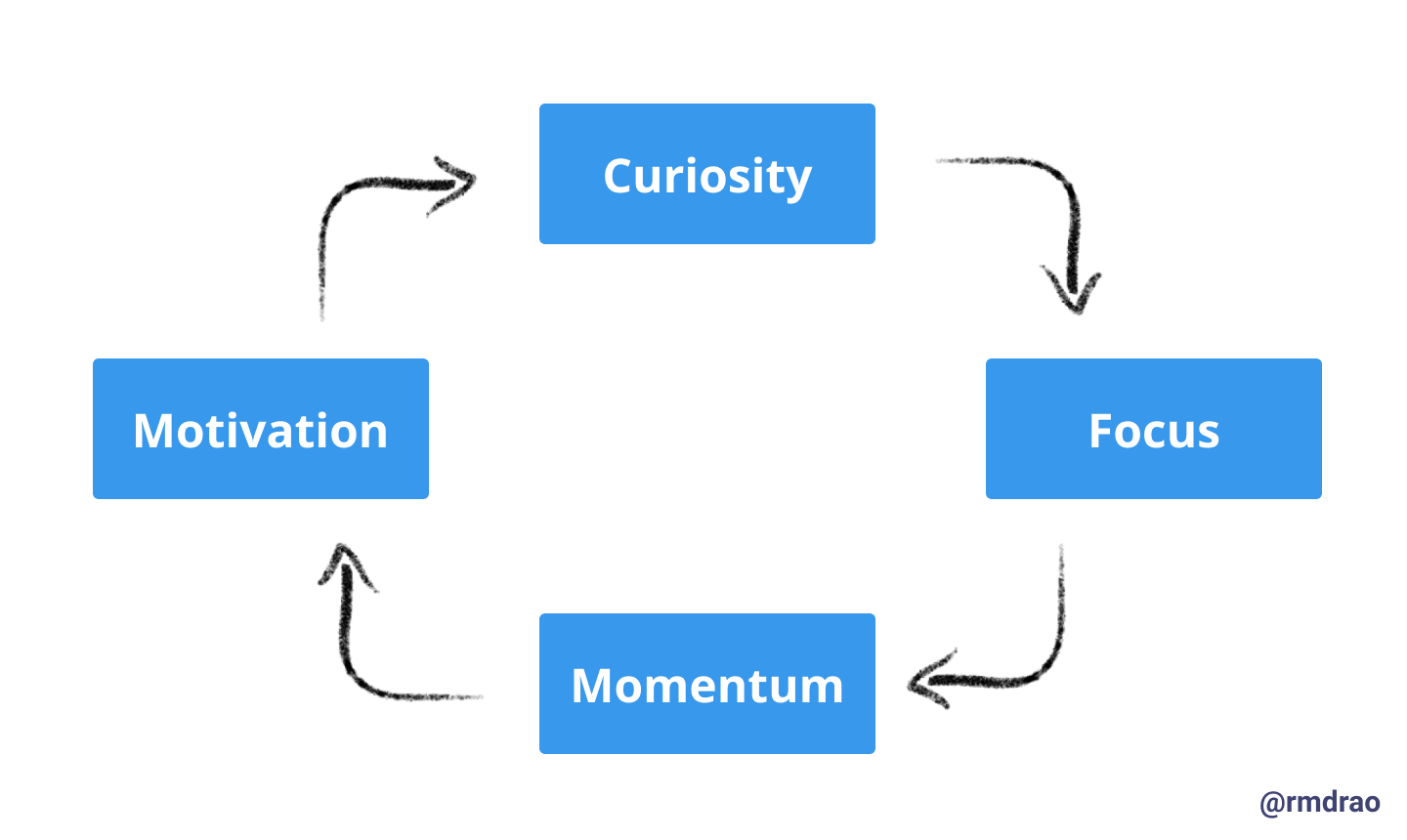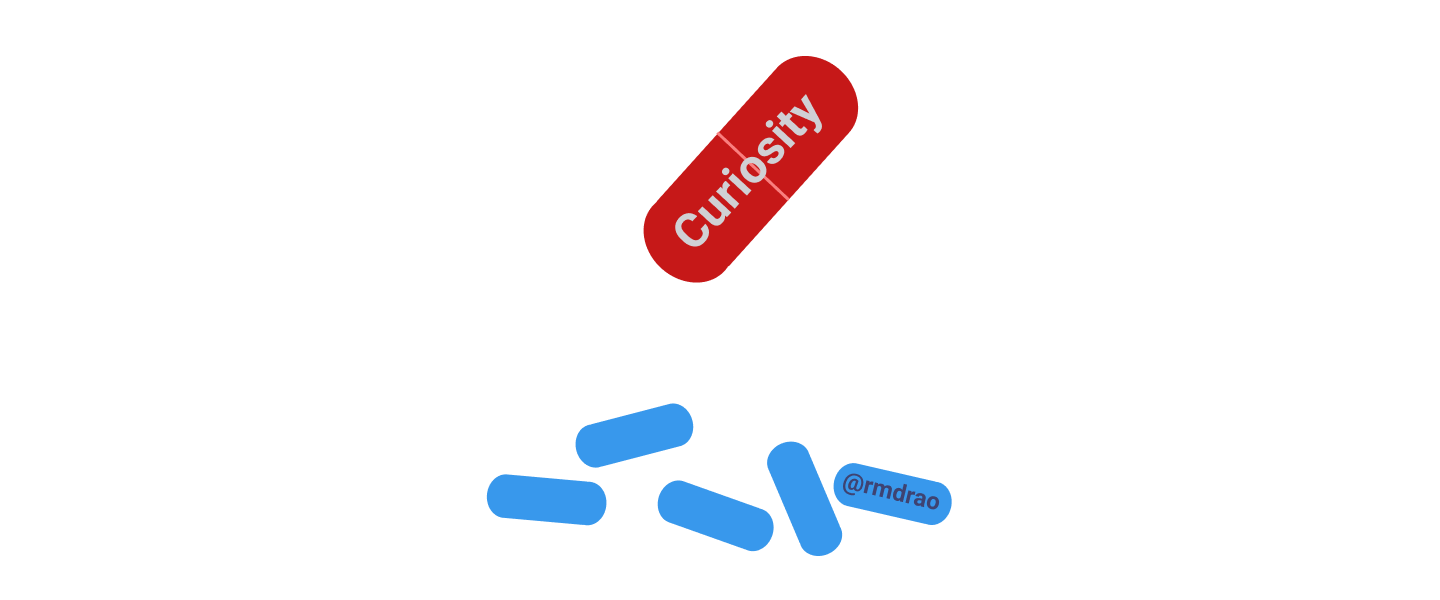
I love training montages in movies. The sequences compress the hardship of rigorous training and set the tone for eventual victory for the main character. These usually well shot few min sequences of seeing the character go from being out of shape to someone skilled is cinema gold. My favorites are from Rocky and Karate Kid. Seeing someone quickly change their life around in a meaningful way by their actions is the kind of hope we live for. However, in my experience, we spend a lifetime waiting for this motivation and more importantly the cue to begin our montage. We are looking at a small section of the journey and missing the key inputs that precede it.
TLDR: I hypothesize that it is curiosity is what propels people to great achievements
There are broadly 2 kinds of motivations. One is external motivation, the kind that is driven by the expectation of external rewards. These could be outcomes based on gains of wealth, power, or avoiding risk. Advertisers and marketers work in this domain of motivation predominantly. This is also the version that sees a Training montage in a movie and gets kicked about it.
However, there is another kind, intrinsic motivation. This is a different animal. You read the entire Harry Potter collection because you are unable to put it down. You pick up a new skill like gardening, not because it relates to your job but because it is enjoyable and interesting. You play badminton not to enter the Olympics but to get better at it. It is driven by the need for competence, autonomy, and challenge. Intrinsic motivation subtly influences your personality.
Most of us admire the great before us from Issac Newton, Steve Jobs, Warren Buffet, Dhirubhai Ambani, and Elon Musks of the world. When you look at their successes they seem like individuals who have achieved much with sheer grit and motivation. Yet when you look at their life journeys a bit closer, to try to figure out the exact moment they got struck by motivation you would be disappointed. Those moments don't exist.
What does exist without fail is a very curious mind that iterates, tinkers and tries to improve its understanding of the world around. They do this with several streams of ideas, some work, some don't. They end up net ahead due to their mastery of the method. Newton had an irrational love for describing the world he saw in numbers and made significant progress in Physics. What is however not that well known is that he was curious and obsessed with Theology, Occult, and Alchemy. It all starts with Curiosity.
If you are unclear about what drives your learning here is a small hack. Look back at times where you spent an inordinate amount of time and effort without being required to. In my case, this typically happens when I am producing something and getting my hands dirty. This could be a spreadsheet, my blog, an illustration, going deep into a piece of music because it keeps me in the moment. Any task that draws you and consumes you are a good candidate for where your curiosities lie.
Curiosity is to learning, what hunger is for sustenance.
When curiosity drives your learning it creates a natural feedback loop. Curiosity drives focus in your efforts, focus gives you momentum and momentum leads to motivation.

For me that makes curiosity is a superpower because
- Deep Work mode is enabled
You work on things that matter to you, time ceases to matter, your efforts line up better. The ability to dig deep into an area without distractions is a skill that reduces time to insight and produces results quickly. This produces work that is hard to replicate. We encounter problems that are cognitively demanding quite often. The ones that make progress are the ones we are obsessively curious about.
- Serendipity
Curiosity is a trait that is not limited to an area. There exists a childlike state of possibilities of mixing and matching. For a while, we have justified not pursuing multiple interests in the name of focus but the tide is turning on this one. If you let curiosity drive your learning, you are assured to have a large surface area for the problem you are tackling. A larger surface area in turn means discovering patterns that you hadn't thought about previously.
- Improves thinking
Firstly curiosity switches your mind from passive to active mode. Curiosity leads to questions and challenging assumptions. You work your way towards solving something by asking questions, hopefully, the right ones. Asking better questions leads to changing your mental models, outcomes and mastery. Curiosity leads to more innovation in creative and non-creative fields.
Conclusion
Motivation combined with ability, a unique viewpoint is what separates the greats. Without exception ability and a unique viewpoint are only seen in people who are lifelong learners and eternally curious. Motivations are not transferable, you need to make your own. You make it by following things that you are curious about, excite you, things that you want to understand deeply for reasons unique to you.
Credits:
This has been a long pending essay, I must thank Sylvain Reiter, Abhishek Verma and other fellow write of passage alumni for their feedback.


